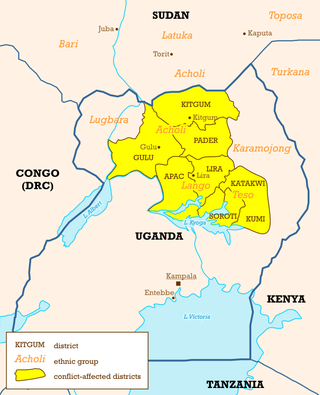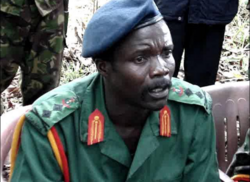
The Lord's Resistance Army insurgency is a conflict involving the Lord's Resistance Army against the government of Uganda. Following the Ugandan Civil War, militant Joseph Kony formed the Lord's Resistance Army and launched an insurgency against the newly installed President Yoweri Museveni. The stated goal was to establish a Christian state based on the Ten Commandments. Currently, there is low-level LRA activity in eastern areas of the Democratic Republic of the Congo and the Central African Republic. Kony proclaims himself the 'spokesperson' of God and a spirit medium.
The Uganda People's Democratic Army (UPDA) was a rebel group operating in northern Uganda from March 1986 to June 1988.

Betty Oyella Bigombe, also known as Betty Atuku Bigombe, is a Ugandan politician who served as the Senior Director for Fragility, Conflict, and Violence at the World Bank from 2014 to 2017. She was appointed in June 2014. From May 2011 until June 2014, she was the State Minister for Water Resources in the Uganda Cabinet. She was appointed on 27 May 2011. She concurrently served as the elected Member of Parliament (MP), representing Amuru District Women's Constituency. She resigned from the two appointments on 1 June 2014.

The period from 1986 to 1994 of the Lord's Resistance Army insurgency is the early history of the ongoing insurgency of the Lord's Resistance Army (LRA) rebel group in Uganda, which has been described as one of the most under-reported humanitarian crises in the world. The Lord's Resistance Army was formed in early 1987 out of the conflict following the successful rebellion of the National Resistance Army (NRA), though remained a relative small group through the counterinsurgency of the NRA. As the peace talks initiated by Minister Betty Bigombe failed Sudanese support to the LRA intensified the conflict.

The start of the period 1994 to 2002 of the Lord's Resistance Army insurgency in northern Uganda saw the conflict intensifying due to Sudanese support to the rebels. There was a peak of bloodshed in the mid-1990s and then a gradual subsiding of the conflict. Violence was renewed beginning with the offensive by the Uganda People's Defence Force in 2002.
The period from 2000 to 2006 of the Lord's Resistance Army insurgency in northern Uganda begins with the assault of the Uganda People's Defence Force (UPDF) upon LRA strongholds in South Sudan. This in turn led to a series of retaliatory attacks by the Lord's Resistance Army of an intensity not seen to since the mid-1990s. International awareness of the conflict gradually grew and in September 2005, the International Criminal Court issues warrants for the arrest of senior LRA commanders, including Joseph Kony.
Dominic Ongwen is a Ugandan former child soldier and former commander of one of the brigades of the Ugandan guerrilla group Lord's Resistance Army (LRA).
The Aboke abductions were the kidnapping of 139 secondary school female students from St. Mary's College Secondary school by rebels of the Lord's Resistance Army (LRA) on 10 October 1996, in Aboke, Kole District, Uganda. The deputy head mistress of the college, Sister Rachele Fassera of Italy, pursued the rebels and successfully negotiated the release of 109 of the girls. The Aboke abductions and Fassera's dramatic actions drew international attention, unprecedented at that time, to the insurgency in northern Uganda. A book titled "Aboke Girls" was written by Els De Temmerman about the abductions and effects of the abductions.

The Juba talks were a series of negotiations between the government of Uganda and the Lord's Resistance Army rebel group over the terms of a ceasefire and possible peace agreement. The talks, held in Juba, the capital of autonomous Southern Sudan, began in July 2006 and were mediated by Riek Machar, the Vice President of Southern Sudan. The talks, which had resulted in a ceasefire by September 2006, were described as the best chance ever for a negotiated settlement to the 20-year-old war. However, LRA leader Joseph Kony refused to sign the peace agreement in April 2008. Two months later, the LRA carried out an attack on a Southern Sudanese town, prompting the Government of Southern Sudan to officially withdraw from their mediation role.
The Atiak massacre occurred on April 20, 1995, when a group of estimated 300 Lord's Resistance Army soldiers led by Vincent Otti entered the northern Ugandan town of Atiak, Amuru District. After routing the UPDF and rounding up hundreds of civilians, the LRA announced, "you Acholi have refused to support us. We shall now teach you a lesson." The LRA then handpicked young boys and young girls from the rest, in order to conscript into their ranks and to use as sex slaves, and marched them into the bush. Most of the remaining 200–300 captives were executed by gunfire.

The Lord's Resistance Army (LRA) is a Christian extremist organization operating in Central Africa and East Africa. Its origins were in the Ugandan insurgency (1986–1994) against President Yoweri Museveni during which Joseph Rao Kony founded the LRA in 1987.
The 2008–2009 Garamba offensive started on 14 December 2008, when joint Ugandan, DR Congolese and Southern Sudanese forces launched a botched military attack against the Lord's Resistance Army (LRA) in the Garamba region of DR Congo.

Invisible Children, Inc., founded in 2004, is an organization to increase awareness of the activities of the Lord's Resistance Army (LRA) in Central Africa, and its leader, Joseph Kony. Specifically, the group seeks to put an end to the practices of the LRA, which include abductions and abuse of children, and forcing them to serve as soldiers. To this end, Invisible Children urges the United States government to take military action in the central region of Africa. Invisible Children also operates as a charitable organization, soliciting donations and selling merchandise to raise money for its cause. The organization promotes its cause by dispensing films on the internet and presenting in high schools and colleges around the United States.

The International Criminal Court investigation in Uganda or the situation in Uganda is an ongoing investigation by the International Criminal Court (ICC) into the Lord's Resistance Army insurgency which has been taking place in northern Uganda and neighbouring regions since 1987. The Lord's Resistance Army is a Christian-based group led by Joseph Kony that is accused of numerous human rights violations and war crimes including massacres, the abduction of civilians, the use of child soldiers, sexual enslavement, torture, and pillaging. After the government of Uganda referred the matter to the ICC in December 2003, warrants of arrest were issued in 2005 for Joseph Kony, Raska Lukwiya, Okot Odhiambo, Dominic Ongwen, and Vincent Otti, who became the first people to be indicted by the Court.

Kony 2012 is a 2012 American short documentary film produced by Invisible Children, Inc. The film's purpose was to make Ugandan cult leader, war criminal, and ICC fugitive Joseph Kony globally known so as to have him arrested by the end of 2012. The film was released on March 5, 2012, and spread virally, and the campaign was initially supported by various celebrities.
StGiNU is an advocacy group formed in the beginning of 2005 by Ugandans living in the United Kingdom. At that time, the situation in the concentration camps in Northern Uganda was claiming lives more than cross fire casualties. In the same year 2005, the Ugandan World Health Organization reported that there were 5000 excess deaths per week due to camp conditions alone.
The Regional Cooperation Initiative for the elimination of the LRA (RCI-LRA) with its military arm, the African Union Regional Task Force was a multi-national operation to counter the Lord's Resistance Army (LRA). On 22 November 2011 the AU Peace and Security Council authorized the RCI-LRA with the mandate to "strengthen the operational capabilities of the countries affected by the atrocities of the LRA, create an environment conducive to the stabilization of the affected areas, free of LRA atrocities, and facilitate the delivery of humanitarian aid to affected areas." The United Nations provided logistical support, the European Union and African Union contributed additional funding, and the United States provided non-combat military and strategic support.
Major General Richard Otto, is a senior military officer in the Uganda People's Defence Forces (UPDF). Effective 13 May 2024, he is the Commander of the UPDF Mountain Division and also Commander of "Operation Shujaa", the joint undertaking by the UPDF and the Armed Forces of the Democratic Republic of the Congo (FARDC) to neutralize the Allied Democratic Front (ADF) terrorist organization in the Eastern DR Congo. Immediately prior to his current assignment, Richard Otto was the chairman of the "South Sudan Peace Mechanism", an IGAD-sponsored observer mechanism, to ensure adherence to the peace treaties by the protagonists.

The Acholi people are a Nilotic ethnic group of Luo peoples, found in Magwi County in South Sudan and Northern Uganda, including the districts of Agago, Amuru, Gulu, Kitgum, Nwoya, Lamwo, Pader and Omoro District. The Acholi were estimated to number 2.3 million people and over 45,000 more were living in South Sudan in 2000.
Doctor Achaye is a former Ugandan commander of Lord's Resistance Army.








